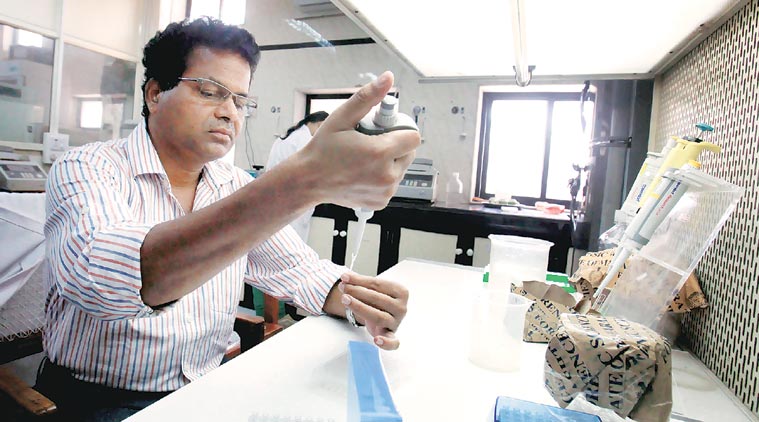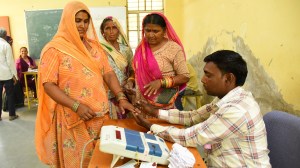- India
- International
Beef in a petri dish: A day in the life of Shrikant Lade
The Mumbai lab has got exclusive kits to determine the origin of seized bovine meat — whether cow, buffalo, or bullock — to see if the samples fall foul of the Maharashtra beef ban
 Lade, whose tests helped nab the Shakti Mills rape accused and identify Kasab’s cap on Kuber, says the “additional” work is adding to their backlog. (Source: Express photo by Vasant Prabhu)
Lade, whose tests helped nab the Shakti Mills rape accused and identify Kasab’s cap on Kuber, says the “additional” work is adding to their backlog. (Source: Express photo by Vasant Prabhu)
A sharp pair of scissors cuts through the succulent meat — handled by the only man in Maharashtra not afraid of the consequences of possessing a kilogram of beef. The “non-vegetarian, but non-beef eating” Shrikant Lade, 49, is, in fact, observing a fast today, but it is not an ordinary Thursday.
Sixteen samples of meat seized from Mumbai, Malegaon, Nashik and Nagpur districts lie waiting for Lade, an Assistant Director at the Forensic Science Laboratory (FSL) at Kalina, a Mumbai suburb.
For the first time since the DNA section of the FSL was inaugurated in 2002, Lade, who heads the section, would take a break from his “always full and almost all on priority” human identification (HID) cases to test animal samples. He will be testing meat samples from the state to determine their exact origin — cow, buffalo, or bullock.
[related-post]
This will be the first such test at the lab since the beef ban was enforced in the state in April this year, possibly the only in the country for “nailing the accused”, he claims.
Until a week ago, all that the Kalina FSL’s DNA lab could tell from a meat sample was if it belonged to the Bovidae family (cloven-hoofed, ruminant mammals), which includes all cattle. With three kits purchased post the ban, each with a capacity of testing 100 samples, the FSL is finally ready for ‘wildlife forensics’. Besides telling one bovine meat from the other, the kits can also identify “peacock samples”.

Dressed in a white linen shirt and black trousers, Lade walks into his office a little after 10 am. The last time he worked with a meat sample was 11 years ago. He had identified that the sample belonged to the Bovidae family, at the Biology department at FSL. “No idea what happened with that case. Only cow slaughter was banned back then,” he says.
Blue polythene bags full of meat jostle for space with vials of sealed human blood, urine and semen samples and amber-coloured glass bottles in the laboratory. The biggest of the “specimens”, a bag with 3 kg of meat, has been sitting in a crowded compartment of fridge number 3 of the laboratory, stored at 4°C, since April 2015.
For the man who has the distinction of providing clinching evidence that resulted in the first case being registered under the new Maharashtra Animal Preservation (Amendment) Act — three men from Malegaon were booked for allegedly slaughtering calves — Lade is rather shy. He tears through the bags in a nonchalant manner. Only one assistant gets to help Lade, while the others with their stained lab coats are busy pouring over other HID (human identification) results.
Lade, a “Buddhist Scheduled Caste”, is peeved with the beef ban, not because it restricts people’s diet or affects businesses, but because of the considerable increase in his workload at the laboratory. He hadn’t braced for that when the ban was imposed.
In the laboratory, Lade first cuts the extracted piece of animal tissue into tiny segments and places a milligram of it in a centrifuge tube. He and his assistant repeat the process for 16 different samples, labelling each tube and taking notes in their sheet.
“That’s DNA extraction,” points out Lade’s assistant, who did not wish to be named. The DNA is then mixed with ethanol and put in the centrifuge machine — “DNA washing”, Lade adds.
Lade now holds the tube against the light coming through his window and points to the tiny specks that are now visible.
It’s just last month that Lade and five other DNA profilers or ‘reporting officers’ were trained to use these kits. He spent the previous week “validating” the three kits — cattle sex determination kit, cow species identification kit and buffalo species identification kit.
These kits were purchased specifically to distinguish bovine meat following the beef ban in Maharashtra. The first two kits, with their specific ‘primers’ and ‘enzymes’, help distinguish between cow and bullock meat (both banned), while the third identifies if the sample belongs to a buffalo.
It’s lunch time. The only man in the laboratory not wearing a lab coat, Lade removes his gloves and washes his hands thoroughly. For someone who has 20 kg of meat stocked in his office, Lade prefers his saabudaana khichdi.
An hour later, the “DNA template” is ready for the Real-time Polymerase Chain Reaction (RT-PCR) machine. Three hours later, after DNA amplification and matching, the results will be out. The revelations, in the form of a series of graphs, will impact the lives of at least 20 people in the state. It would be clear whether they had slaughtered or were in possession of meat from bulls, bullocks or cows — all banned in Maharashtra.
“If the sample is from a cow, the DNA template will react with the cow primer and both peaks will match — that’s how the test works, in short,” Lade explains.
“This is additional work. We are short-staffed and already have a backlog of HID cases from last year,” he says.
Known for its expertise in human DNA, ballistics and narcotics analysis, the FSL delivers over 1.5 lakh results a year. The DNA lab itself is expected to deliver an average of 10 results a month, but Lade claims they deliver about 150 a month.
The “fastest testing” was for the Shakti Mills rape case. “Four days and I was able to nail all six accused,” he recollects.
From Kasab’s cap found on the fishing trawler Kuber to the smallest piece of tissue from the charred bodies of Naval officers on board the INS Sindhurakshak submarine, Lade and his team have managed to match the DNA “correctly”.
“I’m 100 per cent satisfied,” he says. “From 75-year-old grandfathers trying to touch my feet to people coming up to me in courtrooms saying ‘aap nahi rehte toh kya hota (what would we do without you)’, it’s good to think we play a role in bringing justice,” Lade signs off.
non-Meat matters
# In 2013, the Kalina FSL provided 1,74,000 results and in 2014, they had 1,64,000 results
# In 2013, it provided 2,162 DNA results, in 2014, 2,738 and in 2015, the DNA facility has received 1,072 cases since January
Apr 23: Latest News
- 01
- 02
- 03
- 04
- 05






































